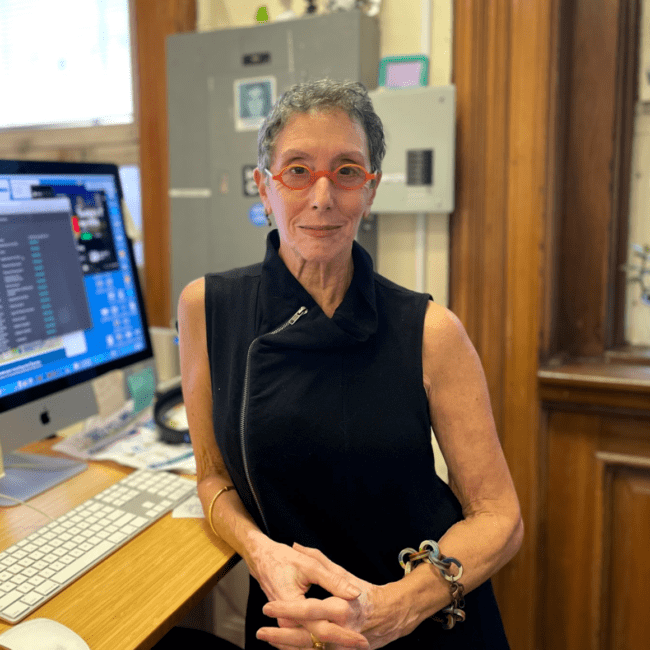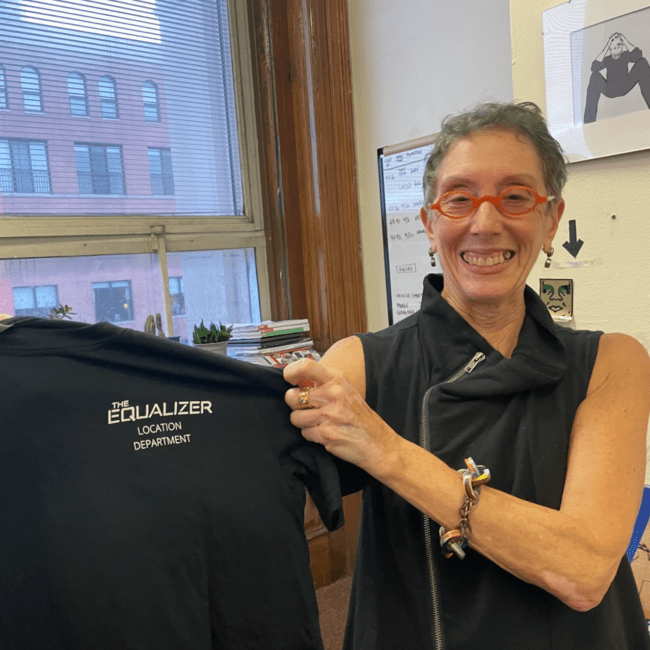If it feels like there’s always something filming in Jersey City, you’re not wrong. JC’s gorgeous architecture, access to Liberty State Park, and diversity of neighborhoods make Chilltown a multipurpose spot for all kinds of movies and TV shows. We spoke to the woman behind it all, Stephanie Daniels, to learn about how the City manages all of this activity.
About the Jersey City Film Office

Stephanie Daniels’ official title is Creative Director for FilmJC, but it’s clearly a catch-all term for someone who makes things happen for both the City and the productions. The Film Office is where anyone who wants to shoot a show or film on public land in Jersey City goes to work with the City. This is where permits and applications are filed, any street closures are cleared, and any community relations activities are generated.
Stephanie took this role in 2013, thinking it would last six months. She was brought on by then newly-elected Mayor Stephen Fulop to modernize and improve the film office. Her background is in TV and film productions and has won an Emmy for her work. “When I got here in 2013, everything was on paper. Productions had to fill out paper forms to get the required permits. Mayor Fulop was willing to invest in the office because he saw the potential for what things could be.”
Read More: Meet Subway Social Club, the Group You Never Knew You Needed
Stephanie looked at other cities with robust filming divisions, talked to location scouts, and learned what she could to make the permit application process as easy as possible for both the productions and the City. “I wanted it to be all-in-one, where productions could get answers and share information,” she said.
The end result was a completely redesigned website where the City could get all of the information it needed from productions in a standardized format. It is both a resource, as it provides answers to many frequently asked questions for production companies, and a tool, as it generates an incredible amount of information for the City to work with as it reviews applications and permits. Stephanie works with location scouts and producers to make sure everyone on both sides has the information needed to make things work.
Community Relations
Stephanie said that an under-discussed aspect of the job is problem-solving for the community. “I’ve always been the kind of person who wants to make things better for my community, and it’s a lot easier to do that at the local level,” she said. “It’s not so much politics as where we live, and I’m able to connect the problem with the ability to solve it.”
One of the most frequently requested permits is for parking or a street closure. Sometimes it’s for a short period of time, but it could be for several weeks. It is the Jersey City residents who bear the burden of accommodating the permit: the City may grant the permit, but the residents are the ones who have to park elsewhere. In the process of granting permits and getting projects set up, Stephanie spends a lot of time working with Councilmembers and the community to share information and manage expectations.
Transparency is important, and Stephanie wants the office to be a resource for residents to learn more about what’s happening in their neighborhoods. For example, a real-time map generated from the permit information is available for residents to know about street closures.
One of the other ways Stephanie manages transparency is by sending out letters to the neighborhood if filming will be taking place. In fact, these letters are required as part of the permitting process. The letter must include the name of the production, contact information, the dates, times, and locations of the filming, and what kind of activity will take place.
Another way of managing the community relations aspect is facilitating meetings between the production and the community. This proved to be a valuable tool during the filming of ‘The Plot Against America’, which was filmed in the Monticello Avenue Special Improvement District in 2018 and 2019. It was a months-long shoot that transformed part of Martin Luther King Jr. Avenue into 1938 America. The film would portray hate speech, specifically anti-Semitic speech, as part of the story. Stephanie organized a meeting with the production team, and representatives from the Monticello Ave SID to discuss what it would be like to have graffiti, posters, and other materials with that type of content up around the neighborhood. The special guests of the meeting were the Jewish community of Hudson County: Stephanie invited every Temple to participate in the meeting, so there were Orthodox, Conservative, and Hasidic Jews in the meeting as well.
“I didn’t want people to be scared or surprised by what would happen once this part of the story began filming,” she said. She described the meeting as a true community dialogue; the filmmakers talked openly, answered questions, and talked through the issues. Through this exchange, she said that people really seemed to get it, that this was a story-telling exercise, and that the filmmakers and the City were trying hard to be clear about what was going on. “People were really appreciative, even to have a place to ask their questions,” she said.
Local Impact

Some of the benefits of a shoot happening in the neighborhood might not be so obvious. Sure, every coffee shop and deli gets a boost from the increased foot traffic, but what else is there? The City can’t charge people for shooting on public property, and some of these productions can be challenging for residents. “The goal is to balance the disruption to the community to the overall benefit,” Stephanie said when weighing different permit requests.
For one, local businesses can make money by renting out their storefronts for a shoot. This was particularly beneficial during 2020 when many businesses had to be closed because of Covid. “During Covid, we had a shoot right down Jersey Avenue for ‘The Equalizer’,” Stephanie said. “The stores made money from renting the spaces, which wasn’t a lot of money, but considering that they had been closed for weeks, it was a huge benefit.”

^ Scene from The Equalizer in Jersey City
(Photo credit: The Equalizer)
Because filming is such an intensive process, residents can get up close to see the inner workings of production. Most people will never get that without working in film or TV, so it’s an educational experience for all involved. Kids and adults get curious when the equipment starts coming out. “People get a real kick out of watching the process,” she said. Stephanie said that in particular, the team from “The Joker” was great at talking to community members. “They did such a good job of talking to people who aren’t in the film, explaining things, and answering questions.”
See More: This Hoboken Resident’s BravoTV Account Has a Nod from Andy Cohen
“The Joker” was practically a capstone project for Stephanie and the Film Office. It was one of the first really big productions that she worked with, and it was important that all of the permits and each little detail worked smoothly. If it went well, she knew that all of the improvements she had made over time would be worth it. Not only did “The Joker” production go exceptionally well, but the relationships built through that project have also led to many repeat productions in Jersey City.
Looking Ahead
Stephanie is excited about what the future holds for FilmJC. First, she says watching the film industry work through Covid-related challenges was inspiring. “The film set rules were more stringent than anywhere else in the world. With so many people, so much money and work that goes into making these shoots happen, they couldn’t take any risks of losing time.”
She went on to describe the security and testing regimes on set. “They had their own testing facilities, and people were getting tested up to twice a day.” People did whatever was necessary to make the production happen, and there was a lot of dedication and effort during that time.
Second, increased financial support and commitment to the film industry means that the industry will continue to grow and thrive. A major example of this investment is the new Caven Point Studios, which recently opened in Jersey City. “We are so excited about Caven Point. There is a real attitude of a partnership between the studio and the City. There will be a lot more opportunities for productions, as some of the logistical burdens can be shared or better managed by working with the studio,” Stephanie said.
To keep up with the Film Office, visit its website here.










